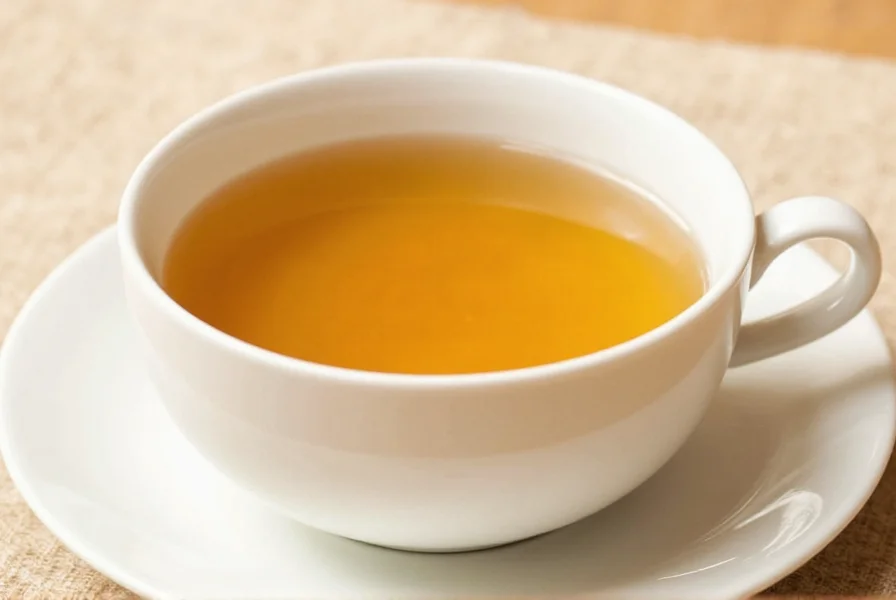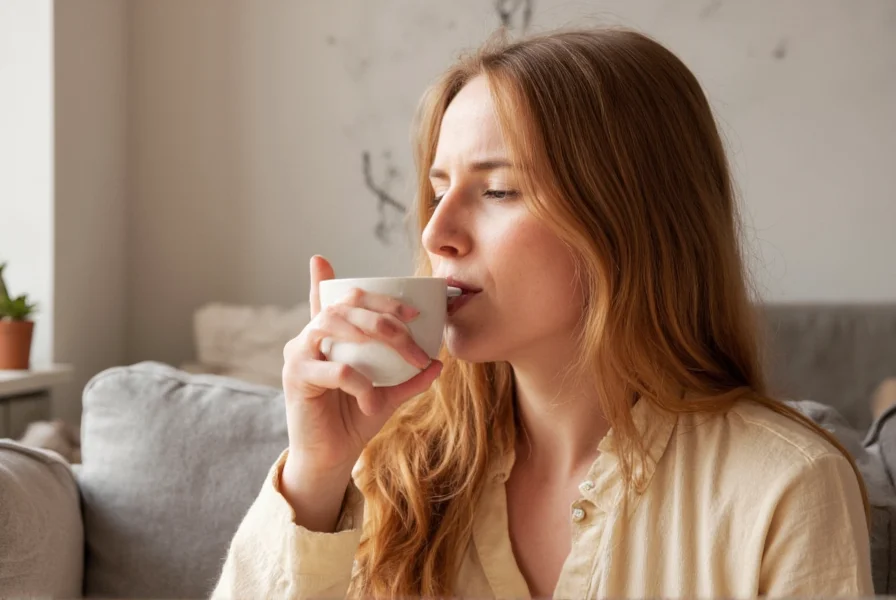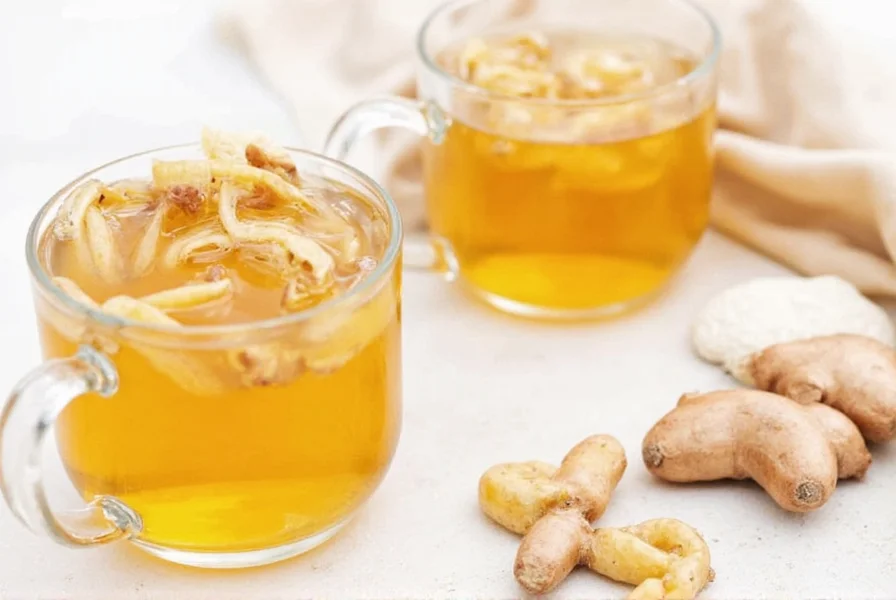When you're battling a persistent cough, many people turn to natural remedies before reaching for over-the-counter medications. Ginger tea stands out as one of the most scientifically supported home treatments for cough relief. This ancient remedy has been used for centuries across various cultures, and modern research continues to validate its therapeutic properties.
The Science Behind Ginger's Cough-Relieving Properties
Ginger (Zingiber officinale) contains potent bioactive compounds, primarily gingerols and shogaols, which give it remarkable medicinal properties. Multiple studies have demonstrated ginger's effectiveness in addressing respiratory symptoms:
- A 2013 study published in the Journal of Ethnopharmacology found that ginger compounds can relax airway muscles, potentially reducing cough frequency
- Research in Food and Chemical Toxicology confirmed ginger's significant anti-inflammatory effects that help soothe irritated throat tissues
- A 2020 review in Complementary Therapies in Medicine highlighted ginger's antioxidant properties that support immune function during respiratory illnesses
Unlike many over-the-counter cough medicines that merely mask symptoms, ginger works through multiple mechanisms to address the root causes of coughing. Its warming properties increase blood flow to the throat area, helping to reduce inflammation while its natural analgesic effects provide immediate soothing relief.
How Ginger Tea Helps Different Types of Coughs
Not all coughs respond equally to ginger treatment. Understanding which cough types benefit most from ginger tea can help you use this remedy effectively:
| Cough Type | Ginger Tea Effectiveness | Recommended Preparation |
|---|---|---|
| Dry, tickly cough | Highly effective | Strong ginger with honey and lemon |
| Productive/wet cough | Moderately effective | Ginger with peppermint and thyme |
| Allergy-induced cough | Moderately effective | Ginger with turmeric and black pepper |
| Whooping cough | Supportive only | Consult physician first |
Ginger tea works particularly well for dry, irritating coughs that often accompany colds and upper respiratory infections. The soothing warmth helps calm the nerve endings in your throat that trigger the cough reflex. For productive coughs where mucus clearance is needed, ginger's effectiveness increases when combined with expectorant herbs like thyme.
Preparing the Most Effective Ginger Tea for Cough Relief
Not all ginger teas are created equal when it comes to cough relief. The preparation method significantly impacts the concentration of active compounds. Here's how to make the most therapeutic ginger tea:

Basic Therapeutic Ginger Tea Recipe
Ingredients:
- 1-2 inches fresh ginger root (organic preferred)
- 2 cups filtered water
- 1 tablespoon raw honey (for adults only)
- Half lemon, juiced
- Optional: Pinch of cayenne pepper for enhanced circulation
Preparation:
- Peel and thinly slice or grate fresh ginger (do not use pre-ground powder for maximum potency)
- Bring water to a boil, then add ginger
- Simmer covered for 15-20 minutes (longer simmering increases potency but may make it more bitter)
- Strain into a mug and add honey and lemon juice
- Sip slowly while warm, 2-3 times daily as needed
The key to maximum effectiveness is using fresh ginger rather than powdered. Fresh ginger contains higher concentrations of gingerols, which transform into the more potent shogaols during the simmering process. The addition of honey provides additional soothing properties and has been shown in studies to be more effective than many cough medicines for nighttime cough relief.
When Ginger Tea Isn't Enough: Knowing Medical Red Flags
While ginger tea is an excellent home remedy for temporary cough relief, certain symptoms require professional medical attention. Ginger tea should complement—not replace—professional healthcare when these warning signs appear:
- Cough lasting longer than 3 weeks
- Blood in mucus or coughed-up material
- Difficulty breathing or wheezing
- High fever (over 101°F/38.3°C) that persists
- Cough following possible choking incident
- Unexplained weight loss accompanying chronic cough
For children under 1 year, never use honey due to botulism risk. Instead, use a small amount of maple syrup or omit sweetener entirely. Children under 6 should consult a pediatrician before using ginger tea as a cough remedy.
Enhancing Your Ginger Tea: Powerful Combinations for Maximum Relief
You can significantly boost ginger tea's cough-relieving properties by adding complementary ingredients. These combinations work synergistically to address multiple aspects of cough symptoms:

- Ginger-Lemon-Honey Tea: Lemon provides vitamin C and citric acid that helps break up mucus, while honey coats the throat and has proven antimicrobial properties
- Ginger-Peppermint Tea: Peppermint's menthol acts as a natural decongestant and cough suppressant, particularly effective for dry coughs
- Ginger-Thyme Tea: Thyme contains thymol, which has expectorant properties that help clear mucus from productive coughs
- Ginger-Turmeric Tea: Turmeric's curcumin enhances ginger's anti-inflammatory effects, particularly helpful for allergy-related coughs
For optimal results, steep these combinations for the full 15-20 minutes to extract maximum therapeutic compounds. Drink while warm, but not scalding hot, to avoid further irritating sensitive throat tissues.
Understanding Ginger Tea's Limitations
Despite its many benefits, ginger tea has important limitations to recognize. It's not a cure for infections causing coughs, but rather provides symptomatic relief while your body heals. Ginger doesn't address bacterial infections that may require antibiotics, nor does it treat serious conditions like asthma or COPD.
Some people may experience mild side effects from ginger tea, including heartburn or stomach upset, particularly when consumed in large quantities. Those taking blood thinners should consult their physician before regular ginger consumption, as ginger may enhance blood-thinning effects.
For most people, however, ginger tea represents a safe, effective option for temporary cough relief that avoids the potential side effects of many over-the-counter medications. When used appropriately as part of a comprehensive approach to respiratory health, ginger tea can significantly improve comfort during common illnesses.
How quickly does ginger tea work for cough relief?
Most people experience soothing effects within 15-30 minutes of drinking warm ginger tea. The anti-inflammatory compounds begin working almost immediately to reduce throat irritation, though complete relief may take several servings over 24-48 hours for persistent coughs.
Can I drink ginger tea for cough while pregnant?
Yes, ginger tea is generally considered safe during pregnancy for cough relief in moderate amounts (up to 1 gram of ginger per day). However, pregnant women should consult their healthcare provider before using ginger regularly, especially during the first trimester.
How much ginger tea should I drink for cough relief?
For optimal cough relief, drink 2-3 cups of properly prepared ginger tea daily. Each serving should contain 1-2 inches of fresh ginger root simmered for 15-20 minutes. Do not exceed 4 grams of ginger daily to avoid potential side effects.
Is fresh ginger better than dried ginger for cough tea?
Yes, fresh ginger contains higher concentrations of gingerols, the active compounds responsible for cough relief. Dried or powdered ginger has lower potency as some compounds degrade during processing. For maximum therapeutic benefit, always use fresh ginger root when making tea for cough relief.
Can children drink ginger tea for cough?
Children over 2 years can safely drink diluted ginger tea for cough relief (use half the adult ginger amount). Never give honey to children under 1 year due to botulism risk. For children under 6, consult a pediatrician before using ginger tea as a cough remedy.











 浙公网安备
33010002000092号
浙公网安备
33010002000092号 浙B2-20120091-4
浙B2-20120091-4